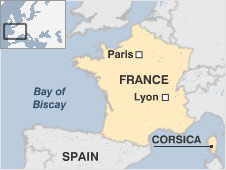 |
A key player on the world stage and a country at the political heart of Europe France paid a high price in both economic and human terms during the two world wars.
The years which followed saw protracted conflicts culminating in independence for Algeria and most other French colonies in Africa as well as decolonisation in south-east Asia.
Overview
France was one of the founding fathers of European integration as the continent sought to rebuild after the devastation of World War II.
In the 1990s Franco-German cooperation was central to European economic integration. The bond between the two countries was again to the fore in the new millennium when their leaders voiced strong opposition as the US-led campaign in Iraq began.
But France sent shockwaves through European Union capitals when its voters rejected the proposed EU constitution in a referendum in May 2005.
France's colonial past is a major contributing factor in the presence of a richly diverse multicultural population. It is home to more than five million people of Arab and African descent.
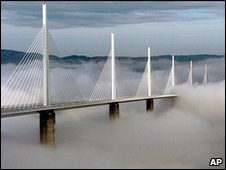
A French icon for the 21st century: the Millau bridge in Massif Central
|
It has a number of territories overseas which together with mainland France and Corsica go to make up the 26 regions which the country comprises. It is further divided into 100 departements four of which - French Guiana Guadeloupe Martinique and Réunion - are geographically distant from Europe.
Government in France is known for its high degree of centralisation but in March 2003 parliament approved amendments to the constitution allowing for the devolution of quite wide-ranging powers to the regions and departements.
In the light of low election turnout the move was widely seen as a bid to re-engage in the political process French people disillusioned by the ubiquitous influence of what is often perceived as the Paris elite.
France has produced some of the continent's most influential writers and thinkers from Descartes and Pascal in the 17th century through Rousseau and Voltaire in the 18th Baudelaire and Flaubert in the 19th to Sartre and Camus in the 20th.
In the last two centuries it has given the art world the works of Renoir Monet Cezanne Gauguin Matisse and Braque to name but a few.
It is also famous for its strong culinary tradition. France produces more than 250 cheeses and some of the world's best-loved wines.
Facts
- Full name: French Republic
- Population: 62.3 million (UN 2009)
- Capital: Paris
- Area: 543965 sq km (210026 sq miles)
- Major language: French
- Major religion: Christianity
- Life expectancy: 78 years (men) 85 years (women) (UN)
- Monetary unit: 1 euro = 100 cents
- Main exports: Machinery and transport equipment agricultural products including wine
- GNI per capita: US $42250 (World Bank 2008)
- Internet domain: .fr
- International dialling code: +33
Leaders
President: Nicolas Sarkozy
Nicolas Sarkozy from the ruling conservative UMP won a decisive victory in the second round of the presidential election in May 2007.
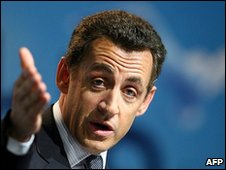 Nicolas Sarkozy has acquired a reputation for plain speaking
|
The key promise on which he fought his election campaign was the introduction of pro-market reforms to tackle sluggish economic growth and high unemployment. He vowed to cut taxes and rein in powerful trades unions.
This process began with the September 2007 budget in which French employers were offered incentives to allow workers to do overtime; there were also tax cuts for high earners. This came just days after Prime Minister Francois Fillon said France was "bankrupt".
The implementation of Mr Sarkozy's policies was bound to hit public sector workers hard and in November 2007 hundreds of thousands of civil servants transport and energy workers staged industrial action in protest at planned cuts to pay and pension benefits.
On foreign policy Mr Sarkozy
has singled out France's role in Europe as a
priority. He has campaigned vigorously for
ratification of the Lisbon Treaty
which was intended to replace the draft EU constitution rejected by French voters in 2005.
France took over the EU's six-month rotating presidency in July 2008 and Mr Sarkozy set himself the tricky task of salvaging the Lisbon Treaty after it had been rejected by Irish voters in a referendum in June.
Just over a month into France's EU presidency Mr Sarkozy's diplomatic skills were put to a stiff test when conflict broke out between Russia and Georgia in August 2008. Acting in Europe's name he took centre-stage in securing a ceasefire - a feat hailed as a big diplomatic success.
He has also taken a lead in calling for fundamental reform of the world's financial system in response to the global credit crunch.
He is seen as being more pro-American than previous French presidents. He cultivated close ties with US President George W. Bush and has made no secret of his admiration for Bush's successor Barack Obama.
Nicolas Sarkozy who was 52 when he was elected is the son of a Hungarian immigrant and a French mother of Greek Jewish origin. He grew up in Paris. Thrice married he has three children.
His predecessor Jacques Chirac had held office since 1995.
French presidents are elected to five-year terms. A candidate can win in one round if he or she secures an absolute majority. Otherwise the top two candidates go through to a second round.
The president who exercises executive power appoints a Council of Ministers headed by the prime minister.
Prime minister: Francois Fillon
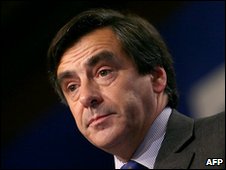
Francois Fillon a confidante of the president
|
Francois Fillon worked closely with Nicolas Sarkozy during the presidential election campaign.
Upon taking office he promised to carry out the president's reform programme and to secure an "eminent" place for France in the 21st century.
As a minister under President Chirac he overhauled the pension system.
He is seen as a moderate within the UMP and is accustomed to negotiating with France's powerful trades unions.
Media
France enjoys a free press and has more than 100 daily newspapers. Most of them are in private hands and are not linked to political parties.
Public broadcaster Radio France runs services for the domestic audience French overseas territories and foreign audiences. Radio France Internationale is one of the world's leading international stations. Its Arabic-language Monte Carlo International service is available on mediumwave (AM) and FM in many Middle East countries.
The international French-language channel TV5 Monde financed by Belgium Canada and Switzerland is available globally. Global satellite news channel France 24 launched in December 2006 with services in French and English. Its chairman said the channel aimed to present "a different point of view from the Anglo-Saxon world".
France's flagship TV station TF1 was privatised in 1987. The growth of satellite and cable has led to a proliferation of channels. Major satellite pay-TV operator CanalSatellite is controlled by media giant Vivendi Universal.
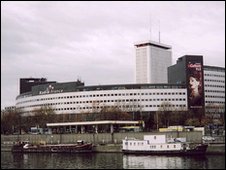
Radio France the country's public broadcaster
|
A digital terrestrial TV service with more than a dozen free-to-air channels is being rolled out.
France's long-established commercial radio stations particularly RTL and Europe 1 still command large audiences. They have been joined by a multiplicity of FM stations often consolidated into successful commercial networks such as hit music station NRJ and oldies station Nostalgie.
The press
- Le Monde - respected national daily considered to be France's newspaper of record
- Liberation - national daily founded in 1973 by philosopher Jean-Paul Sartre centre-left leaning
- Le Figaro - national daily centre-right leaning
- Ouest France - Rennes-based; France's best-selling daily
- L'Express - news weekly
- Le Point - news weekly
Television
- France 2 - national main public TV network
- France 3 - national public
- France 5 - national public educational
- TF1 - national commercial
- M6 - national commercial
- La Chaine Info - rolling news
- France 24 - global news channel owned by public broadcaster and TF1; services in French English Arabic
- TV5 Monde - international French-language TV with programmes from French Belgian Swiss and Canadian public broadcasters
- Canal Plus - national subscription channel
Radio
- Radio France - operates national and regional outlets including speech-based France Inter and all-news France Info
- Radio France Internationale (RFI) - international broadcaster via shortwave and FM relays worldwide
- Europe 1 - major commercial station news and entertainment
- RTL - major commercial station speech and music
- NRJ - commercial leading hit music network
News agency
-
Agence France Presse (AFP) - Paris-based founded in 1835
AFRICA | ASIA-PACIFIC | AMERICAS | EUROPE | MIDDLEEAST | SOUTHASIA
Mauritania Mauritius Morocco Mozambique Namibia Niger Nigeria Republic-of-congo Rwanda Sao-tome-and-principe Senegal Seychelles Sierra-leone Somalia South-africa Sudan Swaziland Tanzania The-gambia Togo Tunisia Uganda zambia Zimbabwe Australia Brunei Burma Cambodia China East-timor Fiji Indonesia Japan Kazakhstan Kiribati Kyrgyzstan Laos Malaysia Marshall-islands Micronesia Mongolia Nauru New-zealand North-korea Palau Papua-new-guinea Samoa Singapore Solomon-islands South-korea Taiwan Tajikistan Thailand The-philippines Tonga Turkmenistan Tuvalu Uzbekistan Vanuatu Vietnam Antigua-and-barbuda Argentina Bahamas Barbados Belize Bolivia Brazil Canada Chile Colombia Costa-rica Cuba Dominica Dominican-republic Ecuador El-salvador Grenada Guatemala GuyanaHaiti Honduras Jamaica Mexico Nicaragua Panama Paraguay Peru St-kitts-and-nevis St-lucia St-vincent-and-the-grenadines Suriname Trinidad-and-tobago United-states-of-america Uruguay Venezuela Albania Andorra Armenia Austria Azerbaijan Belarus Belgium Bosnia-hercegovina Bulgaria Croatia Cyprus Czech-republic Denmark Estonia Finland France Georgia Germany Greece Hungary Iceland Ireland Italy Latvia Liechtenstein Lithuania Luxembourg Macedonia Malta Moldova Monaco Montenegro Norway Poland Portugal Russia San-marino Serbia Slovakia Slovenia Spain Sweden Switzerland The-netherlands Turkey Ukraine United-kingdom Vatican Algeria Egypt Iran Iraq Israel-and-palestinian-territories Jordan Kuwait Lebanon Libya Mauritania Oman Saudi-arabia Sudan Syria Tunisia United-arab-emirates Yemen Afghanistan Bangladesh Bhutan India Nepal Pakistan Sri-Lanka The-Maldives

